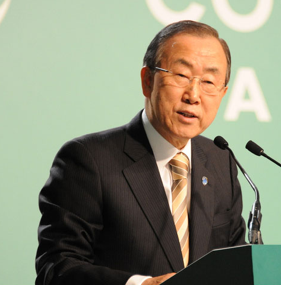In an opinion piece for CNN, UN Secretary-General Ban Ki-moon argues that G7 countries have a “special responsibility to lead” in securing prosperity and dignity for all.
The piece was published ahead of the Schloss Elmau Summit in Germany on 7-8 June 2015, and Ban called on G7 leaders to “show they are serious about … protecting people and the planet.”
 5 June 2015: In an opinion piece for CNN, UN Secretary-General Ban Ki-moon argues that G7 countries have a “special responsibility to lead” in securing prosperity and dignity for all. The piece was published ahead of the Schloss Elmau Summit, held in Germany on 7-8 June 2015. Ban called on G7 leaders to “show they are serious about … protecting people and the planet.”
5 June 2015: In an opinion piece for CNN, UN Secretary-General Ban Ki-moon argues that G7 countries have a “special responsibility to lead” in securing prosperity and dignity for all. The piece was published ahead of the Schloss Elmau Summit, held in Germany on 7-8 June 2015. Ban called on G7 leaders to “show they are serious about … protecting people and the planet.”
Ban writes that the Sustainable Development Goals (SDGs) represent a significant shift in the way international development is conceived and pursued. He underlines that the agenda: seeks to “leave no one behind” by ending poverty and hunger once and for all; targets root causes of poverty and instability including by looking at the interrelationships among economic, social and environmental challenges; and is universal. The “conventional distinctions” among North/South, developed/developing and donor/recipient countries are blurring, he argues, in the face of challenges such as climate change, health pandemics and economic and financial crises. Universality means all countries will need to change.
On financing the new goals, Ban notes that aid to developing countries is only “part of a wider picture” and resources must be raised and spent primarily in countries themselves. He highlights the upcoming Third International Conference on Financing for Development (FfD 3) as a landmark on the way to financing the SDGs and urges G7 leaders to make “this smart investment” in collective well-being.
On climate change, Ban urges G7 countries to follow the lead of Germany, which recently doubled its contribution to climate finance by 2020. Small island developing States (SIDS) and the least developed countries (LDCs), he says, require targeted support. Strong climate targets from the G7 could also help to raise ambition. Ban adds that climate finance is “essential for building the trust needed” for a meaningful, global agreement at the Paris Climate Change Conference scheduled to take place in November-December 2015.
Finally, Ban argues that G7 countries work to should demonstrate that a sustainable future is politically possible and economically viable. [UNSG Opinion Piece]